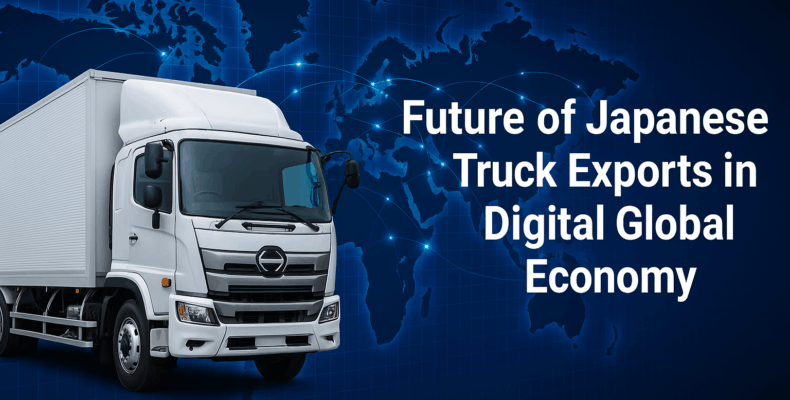In the past, importing Japanese used trucks was a process built on trust, paperwork, and time-consuming manual communication. But the world has changed. Now, in a digital economy where speed, data, and automation rule, Japanese truck exporters are evolving too.
Whether you’re an independent buyer in Kenya or a fleet manager in the Philippines, it’s important to understand how digital tools are reshaping every part of the export process.
Let’s explore the major trends and how global buyers can benefit from this transformation.
🌐 1. Digital Marketplaces Are Taking Over
Gone are the days of emailing exporters for basic photos and pricing.
Now, buyers can browse:
-
Real-time auction platforms
-
Verified dealer inventories
-
Side-by-side comparison tools
-
Mobile-friendly catalogs with 360° views
These platforms use AI filters and instant chat to improve the customer experience. Websites like tradecarview, CarFromJapan, and many independent exporters now offer digital catalogs with transparent pricing and grading.
📱 2. Mobile Access Drives Faster Decisions
Smartphone use is exploding in Africa, Asia, and Latin America. As a result:
-
Buyers search for trucks on mobile-first platforms
-
Messaging apps like WhatsApp and LINE dominate communication
-
Exporters offer real-time video inspections and live Q&A sessions
This mobility means decisions are made faster, and transactions can be closed in hours—not weeks.
📦 3. Digital Logistics and Shipment Tracking
Thanks to cloud-based systems, buyers now receive:
-
Live shipment updates
-
Digital BL (Bill of Lading) and customs forms
-
Estimated arrival dates with port-specific instructions
-
Automated notifications on delays
These tools remove the uncertainty that once surrounded overseas delivery. Buyers feel more in control and better informed.
🤖 4. Artificial Intelligence in Vehicle Selection
Some platforms use AI recommendation engines to match buyers with trucks based on:
-
Budget
-
Intended use
-
Fuel type
-
Past search behavior
These systems reduce time spent browsing and boost satisfaction. For bulk buyers or fleet managers, this automation saves hours per transaction.
🔒 5. Blockchain and Digital Security
Trust is still essential in cross-border trade. But today, blockchain systems and encrypted payment gateways help ensure:
-
Tamper-proof export documentation
-
Clear vehicle history
-
Escrow services for secure transactions
As fraud risks increase in the global marketplace, digital security becomes just as important as truck specs.
🚚 6. Remote Pre-Shipment Inspections
Traditionally, buyers relied only on auction sheets. Now they can request:
-
Drone inspections
-
Live video walkarounds
-
AI-based undercarriage scans
-
Engine diagnostics via remote tools
This reduces the chance of buying a poor-quality truck and improves buyer confidence—especially for high-value units like crane or dump trucks.
📊 7. Data-Driven Exporter Rankings and Reviews
Digital platforms now collect and display exporter ratings from verified buyers. You can easily check:
-
Average response time
-
Shipment success rates
-
Customer reviews with photos
-
Repeat buyer statistics
👉 Want to skip the risk?
Check out this hand-picked list:
Top 5 Trusted Japanese Used Truck Exporters for Global Buyers
These exporters offer transparency, tech support, and a strong digital footprint.
🛒 8. The Rise of E-Commerce for Trucks
Just like Amazon changed consumer shopping, B2B e-commerce is changing truck exports.
-
One-click order systems
-
Online finance tools
-
Currency auto-conversion
-
AI bots answering FAQs 24/7
This shift shortens buying cycles and reduces friction for first-time importers.
🌍 9. Global Reach With Local Experience
Top Japanese exporters are building local partnerships in Africa, the Middle East, and Latin America. These include:
-
Local showrooms for test drives
-
Support with customs clearance
-
Warehousing and financing options
Digital platforms help connect local buyers to Japanese exporters while offering native-language support.
✅ 10. Sustainability Tracking and Green Compliance
Digital compliance tools now help exporters:
-
Track emissions history
-
Share eco-certifications
-
Guide buyers on import regulations by country
This is key as more governments introduce green import laws and carbon standards.
✨ Final Thoughts
The digital economy is not just a trend—it’s the future of Japanese used truck exports. Buyers benefit from faster access, more trust, and smarter decision-making tools. Exporters who embrace these innovations will dominate the global market.
If you’re planning your next truck purchase, go digital—and go with a trusted name.
Would you like a 16:9 banner image titled:
“Future of Japanese Truck Exports in a Digital Economy”
with modern truck imagery and a digital map background? Let me know and I’ll create it immediately.
